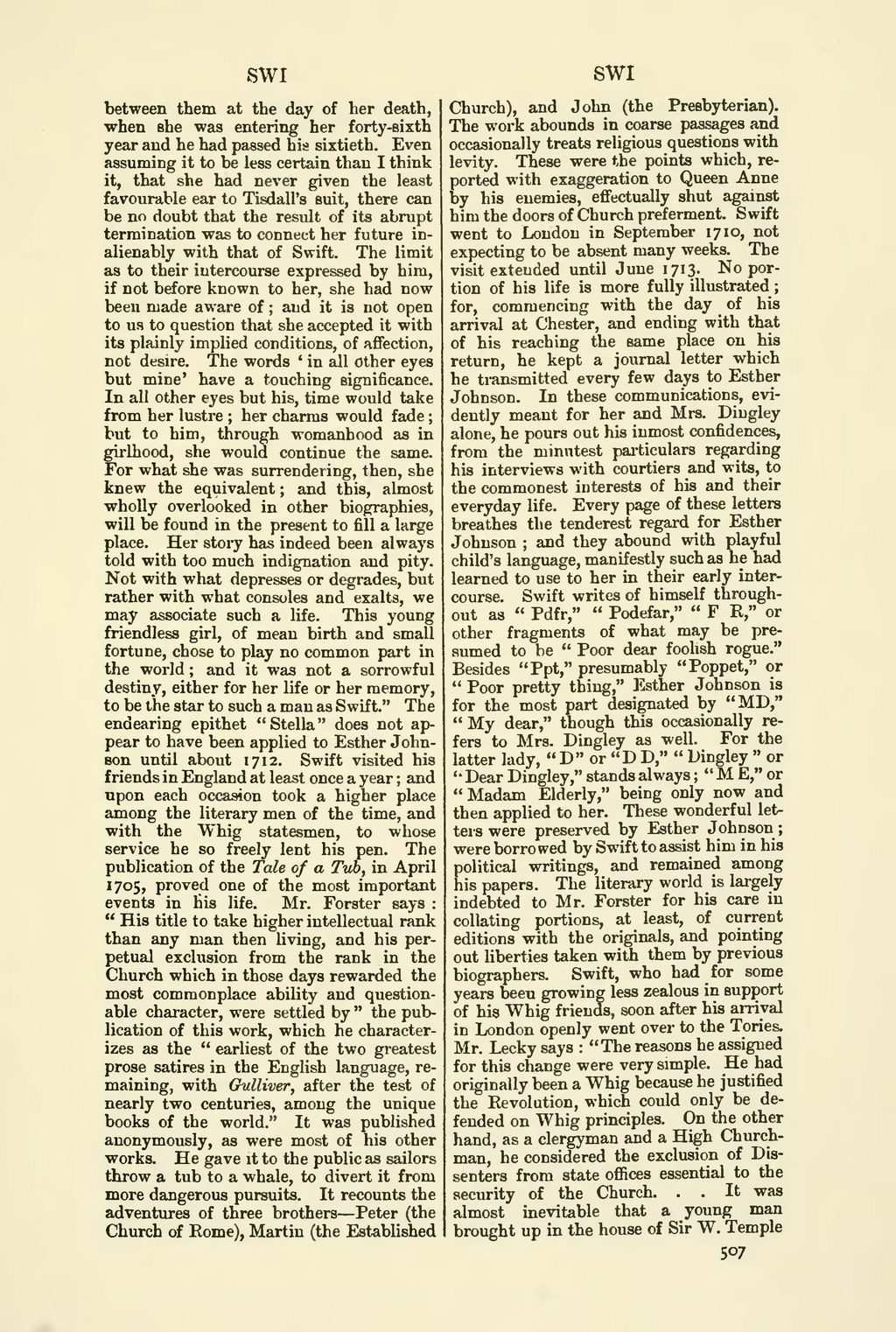SWI
between them at the day of her death, when she was entering her forty-sixth year and he had passed his sixtieth. Even assuming it to be less certain than I think it, that she had never given the least favourable ear to Tisdall's suit, there can be no doubt that the result of its abrupt termination was to connect her future in- alienably with that of Swift. The limit as to their intercourse expressed by him, if not before known to her, she had now been made aware of ; and it is not open to us to question that she accepted it with its plainly implied conditions, of affection, not desire. The words ' in all other eyes but mine' have a touching significance. In all other eyes but his, time would take from her lustre ; her charms would fade ; but to him, through womanhood as in girlhood, she would continue the same. For what she was surrendering, then, she knew the equivalent ; and this, almost wholly overlooked in other biographies, will be found in the present to fill a large place. Her story has indeed been always told with too much indignation and pity. Not with what depresses or degrades, but rather with what consoles and exalts, we may associate such a life. This young friendless girl, of mean birth and small fortune, chose to play no common part in the world ; and it was not a sorrowful destiny, either for her life or her memory, to be the star to such a man as Swift." The endearing epithet "Stella" does not ap- pear to have been applied to Esther John- son until about 171 2. Swift visited his friends in England at least once a year ; and upon each occasion took a higher place among the literary men of the time, and with the Whig statesmen, to whose service he so freely lent his pen. The publication of the Tale of a Tub, in April 1705, proved one of the most important events in his life. Mr. Forster says : " His title to take higher intellectual rank than any man then living, and his per- petual exclusion from the rank in the Church which in those days rewarded the most commonplace ability and question- able character, were settled by " the pub- lication of this work, which he character- izes as the " earliest of the two greatest prose satires in the English language, re- maining, with Gulliver, after the test of nearly two centuries, among the unique books of the world." It was published anonymously, as were most of his other works. He gave it to the public as sailors throw a tub to a whale, to divert it from more dangerous pursuits. It recounts the adventures of three brothers — Peter (the Church of Rome), Martin (the Established
SWI
Church), and John (the Presbyterian). The work abounds in coarse passages and occasionally treats religious questions with levity. These were the points which, re- ported with exaggeration to Queen Anne by his enemies, effectually shut against him the doors of Church preferment. Swift went to Loudon in September 17 10, not expecting to be absent many weeks. The visit extended until June 1713. No por- tion of his life is more fully illustrated ; for, commencing with the day of his arrival at Chester, and ending with that of his reaching the same place on his return, he kept a journal letter which he transmitted every few days to Esther Johnson. In these communications, evi- dently meant for her and Mrs. Diugley alone, he pours out his inmost confidences, from the minutest pai-ticulars regarding his interviews with courtiers and wits, to the commonest interests of his and their everyday life. Every page of these letters breathes the tenderest regard for Esther Johnson ; and they abound with playful child's language, manifestly such as he had learned to use to her in their early inter- course. Swift writes of himself through- out as " Pdfr," " Podefar," " F R," or other fragments of what may be pre- sumed to be " Poor dear foohsh rogue." Besides "Ppt," presumably "Poppet," or " Poor pretty thing," Esther Johnson is for the most part designated by "MD," " My dear," though this occasionally re- fers to Mrs. Dingley as well. For the latter lady, " D" or "D D," " Dingley " or " Dear Dingley," stands always ; " M E," or "Madam Elderly," being only now and then applied to her. These wonderful let- ters were preserved by Esther Johnson ; were borrowed by Swift to assist him in his political writings, and remained among his papers. The literary world is largely indebted to Mr. Forster for his care in collating portions, at least, of current editions with the originals, and pointing out liberties taken with them by previous biographers. Swift, who had for some years been growing less zealous in support of his Whig friends, soon after his arrival in London openly went over to the Tories. Mr. Lecky says : "The reasons he assigned for this change were very simple. He had originally been a Whig because he justified the Revolution, which could only be de- fended on Whig principles. On the other hand, as a clergyman and a High Church- man, he considered the exclusion of Dis- senters from state offices essential to the security of the Church. . . It waa almost inevitable that a young man brought up in the house of Sir W. Temple 507

